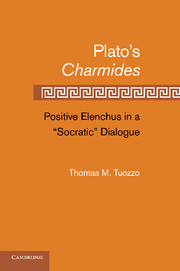Book contents
- Frontmatter
- Contents
- Acknowledgments
- Part One Approaching The Dialogue
- Part Two Approaching The Argument
- Part Three The Dialectical Investigation
- 5 σωϕροσύνη and Its Value
- 6 σωϕροσύνη as Self-Knowledge: Two Reformulations
- 7 Possibility of Self-Knowledge: Critian Formulation
- 8 Possibility of Self-Knowledge: Socratic Formulation
- 9 Return of the Value Question
- 10 Socrates??? Final Speech and Closing Scene
- 11 σωϕροσύνη, Knowledge, and the Good
- Works Cited
- General Index
- Index of Passages
11 - σωϕροσύνη, Knowledge, and the Good
Published online by Cambridge University Press: 05 February 2012
- Frontmatter
- Contents
- Acknowledgments
- Part One Approaching The Dialogue
- Part Two Approaching The Argument
- Part Three The Dialectical Investigation
- 5 σωϕροσύνη and Its Value
- 6 σωϕροσύνη as Self-Knowledge: Two Reformulations
- 7 Possibility of Self-Knowledge: Critian Formulation
- 8 Possibility of Self-Knowledge: Socratic Formulation
- 9 Return of the Value Question
- 10 Socrates??? Final Speech and Closing Scene
- 11 σωϕροσύνη, Knowledge, and the Good
- Works Cited
- General Index
- Index of Passages
Summary
The dialectical discussion of σωϕροσύνη in the Charmides ends in apparent failure. Socrates declares that the last definition of σωϕροσύνη they have discussed – self-knowledge – turns out not to meet the value requirement that all agree any account of σωϕροσύνη must meet. The only kind of knowledge that is useful has proved to be the knowledge of good and bad. The obvious implication, it would seem, is that, if σωϕροσύνη is a kind of knowledge, then it must be the knowledge of good and bad. The participants to the discussion, however, do not go on to consider this as a possible account of σωϕροσύνη; that is a step left for the reader. But the reader’s task is not simply to accept the knowledge of good and bad as the sought-for definition of σωϕροσύνη, perhaps recognizing it as an old friend from other dialogues, and to consider the intricate discussion of self-knowledge as merely the investigation of what turned out to be a dead end. Rather, the reader’s task is to consider how the suggestion that σωϕροσύνη is the knowledge of good and bad may be of help in addressing some of the difficulties in the previous argumentation, with the goal of developing from that argumentation a richer understanding of the nature of σωϕροσύνη. That is the primary task of the present chapter. Before taking it up, however, it will be useful to show how the themes and arguments of the first half of the dialogue set the stage both for the discussion of σωϕροσύνη as self-knowledge and for the eventual appearance of the knowledge of the good.
- Type
- Chapter
- Information
- Plato’s CharmidesPositive Elenchus in a 'Socratic' Dialogue, pp. 304 - 334Publisher: Cambridge University PressPrint publication year: 2011

